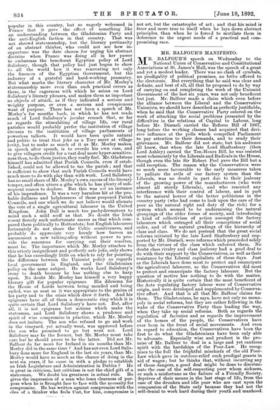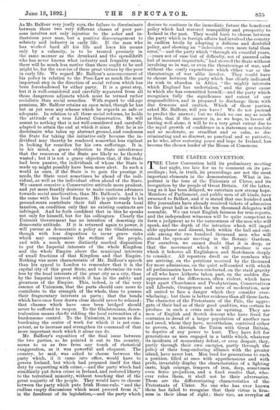MR. BALFOUR'S MANIFESTO.
MR. BALFOUR'S speech on Wednesday to the National Union of Conservative and Constitutional Associations at St. James's Hall, was the speech of a great and yet a modest leader. There was no clash of cymbals, no prodigality of political promises, no bribe offered to the electorate. But everything that he said was clear and definite, and best of all, all that he proposed to do by way of carrying on and completing the work of the Unionist Government of the last six years, was not only beneficent but just. Mr. Balfour made a claim which even before the alliance between the Liberal and the Conservative Unionists, we should have described as perfectly justifiable, when he said that the Conservative Party entered on the work of attacking the social problems presented by the difficulties in the relations of Capital to Labour, long before Mr. Disraeli carried the Reform Bill of 1867, long before the wcrking classes had acquired that deci- sive influence at the polls which compelled Parliament to pay attention to their demands, and to study their grievances. Mr. Balfour did not state, but his audience all knew, that when the late Lord Shaftesbury (then Lord Ashley) carried the Ten-Hours Bill, he was resisted most vehemently by the Liberals and Radicals in the House, though even the late Sir Robert Peel gave the Bill but a cold reception. The reason why the Conservatives were so much more favourable to the early measures taken to palliate the evils of our factory system than the Liberals, was no doubt in part due to their jealousy of the growing power of the manufacturers (who were almost all sturdy Liberals), and who resented any interference with their control of labour, and in part to the natural horror of the better politicians in the country party (who had come to look upon the care of the poor as the natural right and duty of the rich) for a system which seemed to be undermining the natural groupings of the older forms of society, and introducing a kind of collectivism of action amongst the factory labourers which outraged all their conceptions of social order, and of the natural gradings of the hierarchy of class and class. We do not pretend that the great social reforms initiated by the late Lord Shaftesbury and sup- ported by Mr. Disraeli, were reforms which proceeded solely from the virtues of the class which enforced them. No doubt class rivalry and class jealousy had a good deal to do with their support by the Conservatives, as well as their resistance by the Liberal capitalists of those days. Just as the Liberals have done most to protect and emancipate the agricultural labourer, so the Conservatives did most to protect and emancipate the factory labourer. But the question of motive has nothing to do with the matter. Historically it is quite certain that the most beneficent of the Acts regulating factory labour were of Conservative origin, and were developed and supplemented by Conserva- tive effort. And that is all that Mr. Balfour claims for them. The Gladstonians, he says, have not only no mono- poly in social reforms, but they are rather following in the wake of the Conservative Party than leading the way, when they take up social reforms. Both as regards the regulaiion of factories and as regards the improvement of the homes of the people, the Conservatives have ever been in the front of social movements. And even in regard to education, the Conservatives have been the first to do what the Gladstonians have been only able to advocate. Especially wise and prudent is the pro- mise of Mr. Balfour to deal in a large and yet cautious spirit with the hardships of the Poor-Law. He recog- nises to the full the frightful mischiefs of the old Poor- Law which gave in outdoor-relief such prodigal grants in aid of wages ; but he thinks that, without incurring any of those dangers, a good deal might be done to discrimi- nate the case of the self-respecting poor whom sickness, or such a misfortune as the failure of a Friendly Society, deprives of their means in the last stage of life, from the case of the drunken and idle poor who are cast upon the compassion of the State only because they had not the self-denial to work hard during their youth and manhood. As Mr. Balfour very justly says, the failure to discriminate between these two very different classes of poor per- sons involves not only injustice to the sober and in- dustrious poor man, but a positive discouragement to sobriety and industry in early life. If the man who has worked hard all his life and loses his means only by a calamity, is to be treated precisely in the same manner as the drunkard and the spendthrift who has never known what industry and frugality mean, there will be much less motive than there ought to be and might be, for the exercise of these great virtues by the poor in early life. We regard Mr. Balfour's announcement of his policy in relation to the Poor-Law as much the most important step in the direction of social reform which has been foreshadowed by either party. It is a great step, but it is well-considered and carefully separated from all those dangerous adjuncts which must be termed rather socialistic than social remedies. With regard to old-age pensions, Mr. Balfour retains an open mind, though he has not as yet seen any scheme which he regards as safe or adequate. In relation to all these social reforms, he holds the attitude of a true Liberal Conservative. He will assent to nothing that is not well-considered and carefully adapted to attain the end at which it aims. But he is no doctrinaire who takes up abstract ground, and condemns the State for taking the initiative only because the in- dividual may thereby be rendered somewhat less vigilant in looking for remedies for his own sufferings. It is, in his mind, a grave objection to State interference that the resources of the State are likely to be thereby wasted ; but it is not a grave objection that, if the State had been passive, the individuals of whom the State is made up might possibly have been more alert. In such a world as ours, if the State is to gain the prestige it needs, the State must sometimes be ahead of the indi- vidual, as well as the individual often ahead of the State. We cannot conceive a Conservative attitude more prudent, and yet more frankly desirous to make cautious advances towards social amelioration, than Mr. Balfour's. And it is the same with his local finance. He is quite ready to let ground-rents contribute their full share towards local taxation, on condition only that no existing contracts are infringed. And he feels confident that in this he speaks not only for himself, but for his colleagues. Clearly the Unionist Government has no intention of deserting its democratic attitude. If it is returned again to power, it will pursue as democratic a policy as the Gladstonians, though with less disposition to incur grave risks which may compromise the welfare of the people, and with a much more distinctly marked disposition to put the Imperial interests of the whole Kingdom and the whole Empire above the municipal interests of small fractions of that Kingdom and that Empire. Nothing was more characteristic of Mr. Balfour's speech than his appeal to London to remember that it is the capital city of this great State, and to determine its vote less by the local interests of the great city as a city, than by the Imperial interest which it has in the safety and greatness of the Empire. This, indeed, is of the very essence of Unionism, that the parts should care more to contribute to the strength of the whole, than to pursue their fragmentary interests as parts ; that the bonds which have once been drawn close should never be relaxed; that chasms which have once been bridged should never be suffered to reopen. To the Gladstonians, decen- tralisation means chiefly ridding the local extremities of a burdensome control. To the Unionists, it means so dis- burdening the centre of work for which it is not com- petent, as to increase and strengthen its command of that more important work which it alone can do. Mr. Balfour's exposition of the final issue between the two parties, as he pointed it out to the country, seems to us as free from any touch of rhetorical exaggeration, as it was powerful and eloquent. The country, he said, was asked to choose between the party which, if it came into office, would have to govern Ireland, but which had prepared itself for that duty by coquetting with crime,—and the party which had steadfastly put down crime in Ireland, and restored liberty to the terrorised minority, without touching that of the great majority of the people. They would have to choose between the party which puts Irish Home-rule, "and the endless empty discussions which must proceed from it," in the forefront of its legislation,—and the party which desires to continue in the immediate future the beneficent policy which had restored tranquillity and prosperity to Ireland in the past. They would have to choose between the party which in foreign affairs had involved the country in endless broils by adopting a dubious and doubtful policy, and showing an "indecision even more fatal than error,"—and the party which "through six eventful years, =years not of ease but of difficulty, not of assured calm but of incessant inquietude," had steered the State without involving us in war, or even the threatenings of war, and without the costly expenditure which either war or the threatenings of war alike involve. They would have to choose between the party which has clearly indicated its wish to abandon in Africa "the mighty interests which England has undertaken," and the great cause to which she has committed herself, —and the party which recognises fully the significance and extent of our responsibilities, and is prepared to discharge them with due firmness and caution. Which of these parties, asked Mr. Balfour, will you have ? We do not pretend to predict the answer ; but we think we can say as much as this, that if the answer is, as we hope, in favour of leaving well alone, it will be to a very great extent due to the rapid growth of confidence in a statesman so resolute and so moderate, so steadfast and so calm, so dis- criminating and so discreet, so practical and so patriotic, as he who, after restoring peaCe and hope to Ireland, has become the chosen leader of the House of Commons.







































 Previous page
Previous page